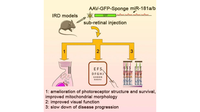miR-181a/b downregulation: a mutation-independent therapeutic approach for inherited retinal diseases
Authors: Sabrina Carrella, Martina Di Guida, Simona Brillante, Davide Piccolo, Ludovica Ciampi, Irene, Guadagnino, Jorge Garcia Piqueras, Mariateresa Pizzo, Elena Marrocco, Marta Molinari, Georgios Petrogiannakis, Sara Barbato, Yulia Ezhova, Alberto Auricchio, Brunella Franco, Elvira De Leonibus, Enrico Maria Surace, Alessia Indrieri, Sandro Banfi
Year: 2022
Sources: EMBO Molecular Medicine
Abstract:
Inherited retinal diseases (IRDs) are a group of diseases whose common landmark is progressive photoreceptor loss. The development of gene-specific therapies for IRDs is hampered by their wide genetic heterogeneity. Mitochondrial dysfunction is proving to constitute one of the key pathogenic events in IRDs; hence, approaches that enhance mitochondrial activities have a promising therapeutic potential for these conditions. We previously reported that miR-181a/b downregulation boosts mitochondrial turnover in models of primary retinal mitochondrial diseases. Here, we show that miR-181a/b silencing has a beneficial effect also in IRDs. In particular, the injection in the subretinal space of an adeno-associated viral vector (AAV) that harbors a miR-181a/b inhibitor (sponge) sequence (AAV2/8-GFP-Sponge-miR-181a/b) improves retinal morphology and visual function both in models of autosomal dominant (RHO-P347S) and of autosomal recessive (rd10) retinitis pigmentosa. Moreover, we demonstrate that miR-181a/b downregulation modulates the level of the mitochondrial fission-related protein Drp1 and rescues the mitochondrial fragmentation in RHO P347S photoreceptors. Overall, these data support the potential use of miR-181a/b downregulation as an innovative mutation-independent therapeutic strategy for IRDs, which can be effective both to delay disease progression and to aid gene-specific therapeutic approaches.
Category: journals

